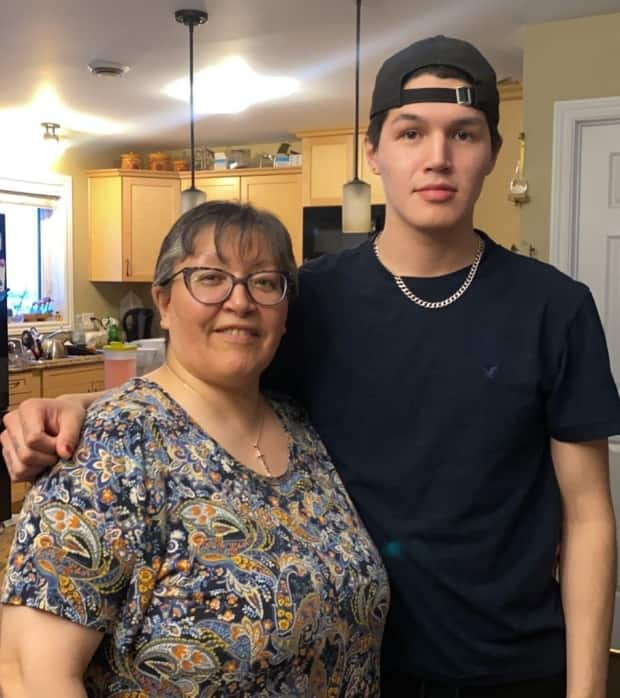Iqaluit family calls for change to funeral standards after dressing own son's body for viewing

WARNING: This story contains upsetting details.
An Iqaluit family was dealt a shocking blow recently, and at a sensitive time.
On Oct. 6, Jukeepa Veevee was preparing for the funeral of her son, Terence Veevee. She had requested to view his body at 11 a.m., a couple hours before the funeral service began at Saint Jude's Anglican Cathedral.
But to her horror, when she got to church Terence was not dressed in the clothes she had provided to Qikiqtani Funeral Services.
"When we opened the casket, he was in a body bag," said Veevee. "The body bag that he was put in when he was picked up by the coroners."
The clothes Veevee had left for Terence to be dressed in were still in the bag she had delivered to the funeral service and placed in the coffin with the body.
"I was really upset and angry," said Veevee. "The services that they [Qikiqtani Funeral Services] say they will provide, they didn't do."
In a rush to fix the situation before the rest of the family arrived to view the body, Veevee and a church reverend tried to dress Terence themselves.
They cut open the body bag and used a tablecloth from the church to cover his top half. Veevee took the pants she provided for her son and laid them over the sweat pants he was dressed in.
"I didn't want my family to see him in a body bag," said Veevee.

Veevee said viewing Terence's body was important to the family in order to come to terms with their loss and be able to say their final goodbyes.
But Veevee said she felt discouraged from viewing the body by the Qikiqtani Funeral Services, being told "it wasn't a good idea."
But she was set on doing so.
The director of Qikiqtani Funeral Services, Jake Gebara, declined CBC's request for an interview.
CBC also spoke to a member of the Saint Jude's Anglican Cathedral, who witnessed the incident and verified the details of the story, but did not want to be interviewed.
1 funeral service in town
Qikiqtani Funeral Services is the only funeral provider in Iqaluit, and the only option for residents when someone dies.
Veevee wrote a letter to the Qikiqtani Funeral Services airing the family's complaints about the "unacceptable treatment" of their loved one.
The letter was sent on Oct. 22 and was also forwarded to the Health Minister John Main, chief coroner Khen Sagadraca, and Iqaluit Mayor Solomon Awa.
"Your main priority as a funeral service provider should be to treat the deceased with the utmost respect," the letter said.
The letter also asked for a public apology, for the service to let families know if their loved ones have been buried in a body bag, and for reimbursement for their funeral costs.
Veevee said Terence's funeral cost nearly $8,000.
"What I'm hoping is for them [Qikiqtani Funeral Services] to do the services that they say they are providing," said Veevee, referring to the section of the Qikiqtani Funeral Services pamphlet that said "prepare bodies for burial."
Veevee said she would volunteer to help prepare and wash bodies for the company.
"I can volunteer. I know there can be other people who will probably be willing to do that," said Veevee. "Because you don't want your loved ones to be just in a body bag like that, not cleaned or anything."
A costly proposition
Most of the Veevee family's funeral expenses were covered by The City of Iqaluit, about $6,000.
The City of Iqaluit will cover the costs of a basic funeral service for Iqaluit residents, when no other form of government assistance covers the costs, according to deputy mayor Kyle Sheppard.

The city allocates $250,000 a year to cover the cost of funerals, said Sheppard.
City council passed a motion in 2020 to cover the costs of funeral expenses and develop a policy around funeral services. That policy is still being drafted, and will need to be presented to council to vote on.
"There's not a lot of legal oversight ability on the municipality or even at the territorial level under existing legislation," said Sheppard
A copy of the new draft bylaw includes fines for those who "fail to provide guidance and support" or "fail to provide viewing and visitation of deceased upon request."
"What we're trying to do with the new bylaws we created is try to entice additional service providers to enter the market to provide people with options," said Sheppard. "Hopefully that element of competition will help, in a sense, to improve those services."
Sheppard said the hopes of the new bylaw will provide a service standard for Iqaluit residents that currently isn't in place.


